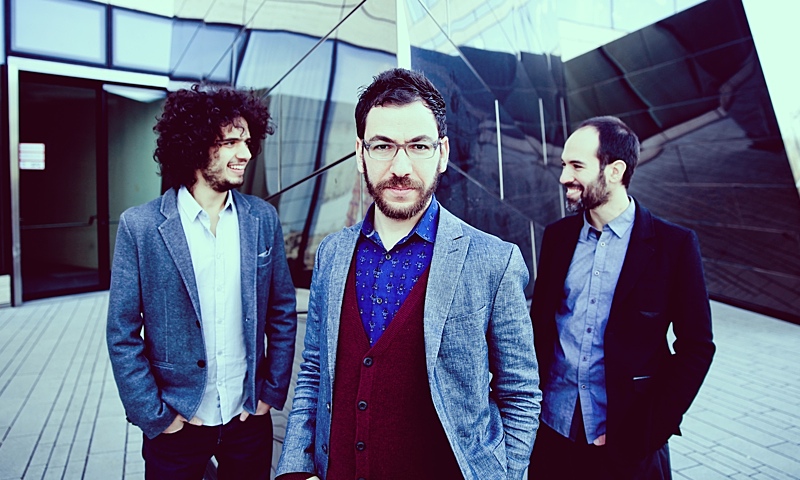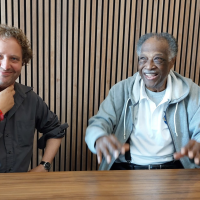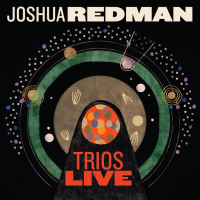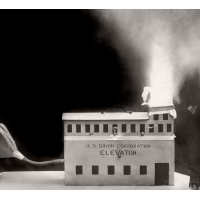Home » Jazz Articles » Interview » Omer Klein: Theme and Variations
Omer Klein: Theme and Variations

The rhythm is what carries the music forward. It's what makes music vital, flowing, alive.
—Omer Klein
Klein has completely his own style and he does not like to label his music. His compositions are influenced by Arab, Israeli and classical music. His improvisations are like classical compositions and his compositions are like elaborate improvisations. One of his musical mentors, Omer Avital, who was introduced to the New York jazz scene in the 1990's said in a 2007 interview "Omer Klein is an exceptional musician. He seems to have his own voice already at this early stage of his musical development, and he is on his way to develop a style of his own.." How his music has developed since can be heard on his latest trio-album: To the Unknown (Plus Loin Music, 2013).
About Jazz:You started to play the piano and composing at the age of 7. Why did you choose this instrument?
Omer Klein: I heard the sound on the radio and saw the instrument on TV, and it got me. I don't know why it attracted me so much, but it certainly called me very clearly. Then when I began to play, and develop my musicality through the years, I understood that it's really the perfect instrument for me. I'm interested in composition, improvisation, groove, harmonies, melodies, colors, orchestration, touch, timbre. I don't know an instrument that gives as many possibilities to explore these subjects as the piano does. Of course, it also has its limitations.
AAJ: Such as?
OK: Notes cannot be bent on the piano. You must always either play a c, or a c sharp. there is a world in between these two notes that is inaccessible for the pianist. This is important because music comes largely from the human voice, and landing only on well-defined notes isn't characteristic of the voice. The pianist tries to find ways to work with, and against, this limitation. Furthermore, a single note, interval or chord, cannot increase in volume after being played on a piano. It of course decreases in volume but not in a totally controlled way. This is another feature of the human voice, and an effect that is naturally and easily performed on string, wind and brass instruments, while the piano doesn't allow it, again forcing the pianist to find creative ways to express this basic musical phenomenon.
AAJ: When you started playing the piano, you also started composing and improvising. What did you play? Jazz?
OK:Jazz came later. First there was a mix of everything that was popular, from Michael Jackson to Israeli popular music, to children songs, to TV series themes. You know, all the readily available stuff. Then when I became an active listener and began seeking for music that will move me, I discovered great Israeli composers: Matti Caspi, Yoni Rechter and Shlomo Gronich. They were my first real musical heroes. I was about 12 or 13 years old.
AAJ: When did you first hear jazz?
OK: I discovered jazz when I was 14 or so, through a CD of Ella Fitzgerald and Oscar Peterson. One of my teachers at school, at the music department, gave me that CD, and played us other jazz records in class. I was hooked. Then I started buying records. John Coltrane, Herbie Hancock and Chick Corea were some of the first jazz musicians I had listened to.
AAJ: How has this jazz music influenced your compositions and improvisations?
OK: Jazz gave me a frame and a language. It gave me a frame because finally I understood what I can do with my musical ideas. I could play a theme and improvise on it. I didn't know classical music well enough yet, so I wasn't really aware of the Theme and Variations form -or if I was, it didn't sound as hip as jazz did. Now I think it's very hip. I also didn't know about other musical worlds that I was soon to discover like Indian music or Arabic music that also involve improvisation. So jazz was really my introduction to this mode of music making. And it also gave me a language, or a set of related languages. I began learning what jazz musicians were doing, and it was stirring my creativity in new directions.
AAJ: How is your relationship with classical music?
OK: I love the music of many baroque, classical, romantic, and modern composers. I listen to it, play it and marvel at it. More specifically as a pianist, I feel that playing classical music on the piano is simply learning the instrument's history, which seems essential to me.
AAJ: How would you like to label your music right now?
OK: I wouldn't label any music. Music is abstract and we keep trying to put it in words. It's nice to try if you want to, and some writers find beautiful words for it, but I don't feel the need.
AAJ: Let me try to set the question otherwise: which artist/ what music are you inspired by today?
OK: I played some [pianist] Scott Joplin's rags today. Yesterday I was checking out some videos of pianist Fred Hersch, to see what he is up to now. I'm also in some kind of a Beatles phase recently.
AAJ: You name Hersch, could you name some other contemporary musicians?
OK: There are many living musicians who inspire me. Naming some will only give too narrow an idea.
AAJ: In the beginning of your professional career you co-founded Mura, a group composing and performing music to texts by Israeli poets. What happened to the group?
OK: Mura, with Alon Lotringer and Shahar Barbash, became inactive because I moved to Boston. But we are still good friends and have collaborated on various projects in recent years. Now we are planning to record our material that was never properly documented.
AAJ: You moved to Boston in 2005 because you received a special scholarship. You attended the New England Conservatory there. What have you learnt there?
OK: My teacher, pianist Danilo Pérez, helped ground my rhythm in Africa. He also opened up my ideas a bit. Saxophonists George Garzone and Jerry Bergonzi gave me an opportunity to accompany a great horn player and to try to deal with the vast of information that they play, and their fierce time. Pianist Ran Blake showed me something about mystery, and about exploring other people's compositions and making them your own.
AAJ: You're a keen educator yourself, you like to transfer all this knowledge. What do you like about that?
OK: I give workshops with my trio and alone. I have been giving quite a number of them in various academies, and also teach yearly at the Jerusalem Music Center. I like teaching. It's a beautiful way to give something and share your ideas and experience. It's also teaching me a lot about music and about humans.
AAJ: Your first record ,Duet, (Fresh Sound, New Talent, 2007) is a duo-album with bassist Haggai Cohen Milo, who is now a member of your trio. How did you experience playing without percussion?
OK:It made us work hard on our time. Every musician should sound like he/she doesn't need a drummer.
AAJ: Please, explain why?
OKI believe it was pianist Thelonious Monk who instructed his musicians to be in charge of the time, and by that he meant all of them and not just the drummer. The rhythm is what carries the music forward. It's what makes music vital, flowing, alive. A musician with a weak sense of rhythm will find it difficult to get his musical ideas through.
AAJ: On your second record, (Introducing Omer Klein, Smalls Records, 2008) you play with another strong bassist, composer Omer Avital.How did you meet him and how did he find you?
OK: Avital was one of my heroes when I was 18 or so. I used to go hear him in Jerusalem and Tel Aviv. I hoped to work with him one day. In 2005 we met and jammed a bit, and since then we became very good friends and close musical collaborators. He moves back to New York after a time in Israel, exactly at the same time of my move to Boston. I would come to New York every weekend to play with him. He taught me dozens of his tunes and was the first to hire me in New York. I owe him a lot!
AAJ: What makes performing with Avital so special?
OK: Omer Avital is like a musical brother to me. We belong to the same family. We connected naturally and easily, and when we play together there is a sense of familiarity and warmth, as if we speak the same language. Since Omer is more experienced than me, I learned a lot from him on composing, leading a band, allowing your music to breathe and develop, and much more. He is a bad cat and I recommend everyone to check out his music.
AAJ: Your third album, Heart Beats (Smalls Records, 2009), is a solo-album. What made you decide to play solo?
OK: I wanted to record another album quickly, because Introducing was getting great reviews and I didn't want to get stuck there. I had many new compositions, and felt that they would work in the solo format. So I went for it.
AAJ: A year later you recorded Rockets on the Balcony(Tzadik, 2010) which was chosen as an Editors' Pick for December 2010 in Downbeat Magazine. Your following album appeared 3 years later. What happened in between?
OK: I was performing a lot during those years and simply didn't feel that I needed to make an album. When I felt it, I made To The Unknown (Plus Loin Music, 2013) with Haggai and Ziv.
AAJ: What made you choose the label Plus Loin Music ?
OK: Plus Loin's manager, Yann Martin, expressed great belief in my music, and it also marked a new love affair with France. I began to play there more and to have an audience there. Naturally it led to offers from several French labels, and I chose to work with Yann.
AAJ: How do you think jazz music will develop?
OK: I think Jazz will keep reacting to the world around it, while looking back at its roots. So the potential for development is endless.
Photo Credit: Courtesy Omer Klein
Tags
omer klein
Interview
Robin Arends
United States
Boston
Omer Avital
Ella Fitzgerald
oscar peterson
John Coltrane
Herbie Hancock
Chick Corea
Scott Joplin
Fred Hersch
Danilo Perez
George Garzone
Jerry Bergonzi
Ran Blake
Haggai Cohen-Milo
Thelonious Monk
PREVIOUS / NEXT
Support All About Jazz
 All About Jazz has been a pillar of jazz since 1995, championing it as an art form and, more importantly, supporting the musicians who make it. Our enduring commitment has made "AAJ" one of the most culturally important websites of its kind, read by hundreds of thousands of fans, musicians and industry figures every month.
All About Jazz has been a pillar of jazz since 1995, championing it as an art form and, more importantly, supporting the musicians who make it. Our enduring commitment has made "AAJ" one of the most culturally important websites of its kind, read by hundreds of thousands of fans, musicians and industry figures every month.






















